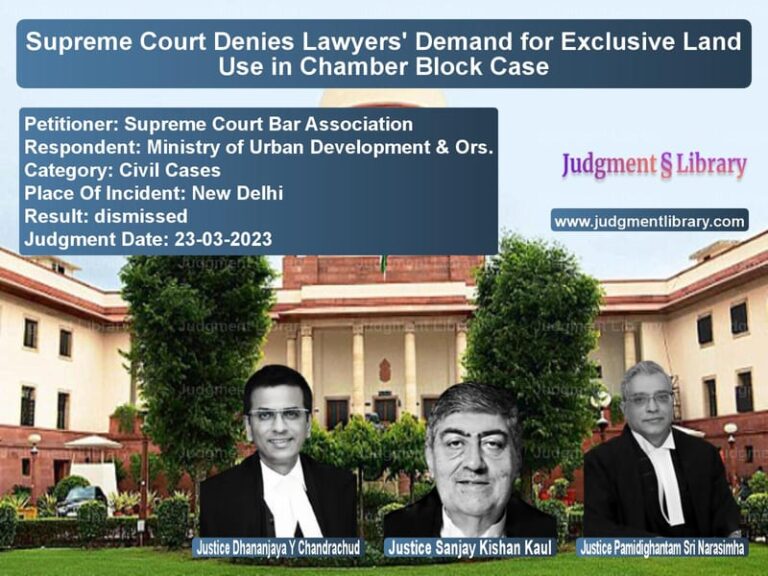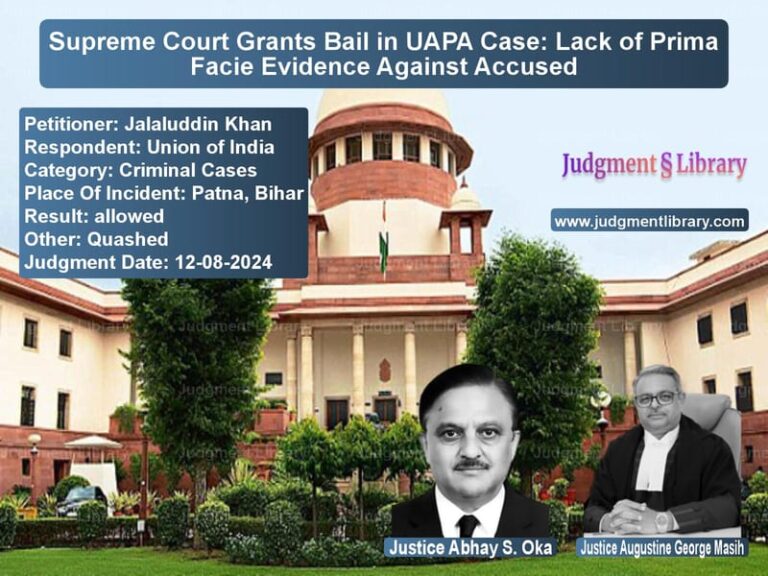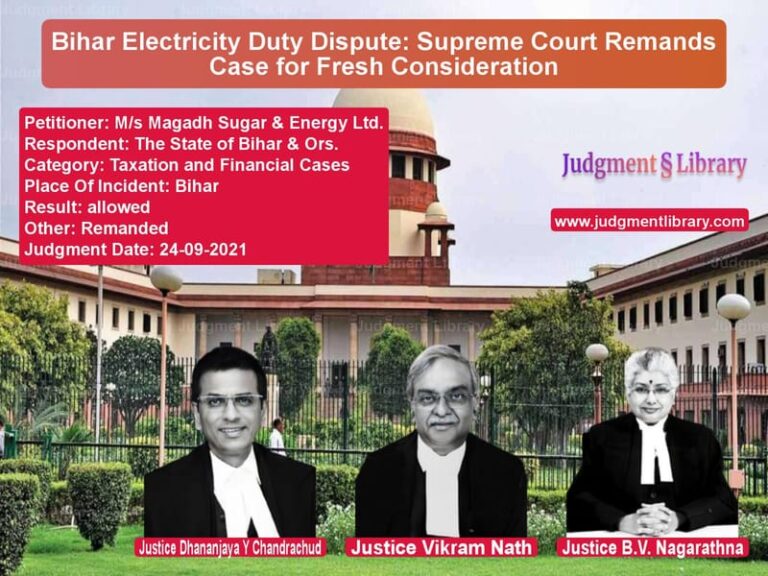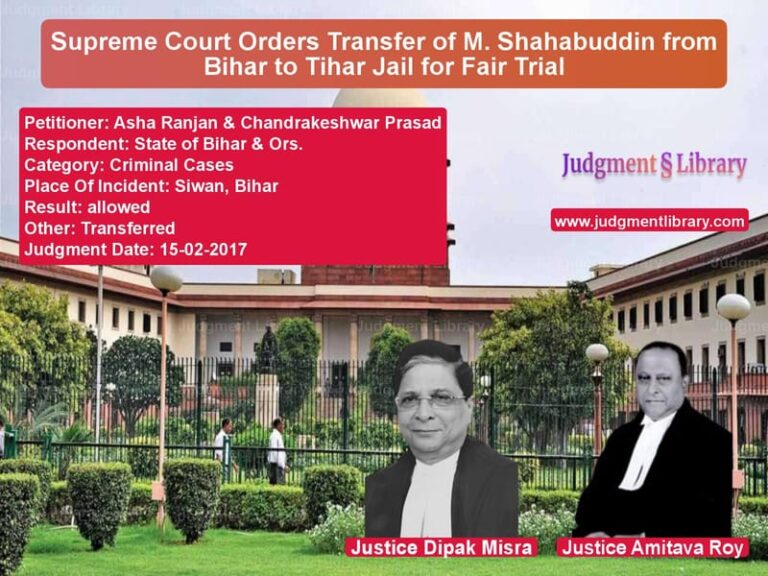Supreme Court Rules on Wheeling and Grid Support Charges in Andhra Pradesh
The Supreme Court of India delivered a landmark judgment on November 29, 2019, in the case of Transmission Corporation of Andhra Pradesh Limited vs. M/S Rain Calcining Limited & Others. This case addressed significant issues concerning the levy of wheeling and grid support charges by Andhra Pradesh Transmission Corporation (APTRANSCO) and the regulatory powers of the Andhra Pradesh Electricity Regulatory Commission (APERC). The Court upheld the validity of APERC’s authority in fixing charges, reversing the decision of the High Court and providing clarity on key electricity regulation principles.
Background of the Case
The appeals before the Supreme Court primarily involved three major issues:
- The competence of APTRANSCO to levy wheeling charges.
- The ability of APTRANSCO to impose grid support charges.
- The continuation of incentives granted to power generators using non-conventional energy sources.
Following economic reforms in the power sector, APSEB was restructured, and APTRANSCO was created to handle transmission. APERC was established under the Andhra Pradesh Electricity Reforms Act, 1998, to regulate electricity pricing and transmission policies.
Key Legal Issues
The Supreme Court examined three major legal questions:
- Whether APERC had the authority to determine and impose wheeling charges on electricity generators.
- Whether grid support charges imposed on captive power plants were justified.
- Whether incentives granted to non-conventional energy producers were meant to continue indefinitely.
Arguments of the Appellant (APTRANSCO & APERC)
The appellants argued that:
- The wheeling charges and grid support charges were essential to maintaining the financial health and operational efficiency of the electricity grid.
- The regulatory framework allowed APERC to determine the tariff structure, including transmission and distribution charges.
- The incentives provided to non-conventional energy producers were subject to review and could not be considered perpetual entitlements.
Arguments of the Respondents (Private Generators & Consumers)
The respondents contended that:
- The wheeling charges were excessive and unfairly imposed, violating existing agreements with private generators.
- Grid support charges were an unjustified burden on captive power plants that relied minimally on the state grid.
- Incentives granted under government policies should be honored indefinitely as a matter of promissory estoppel.
Supreme Court’s Observations
The Supreme Court analyzed the legal provisions and regulatory framework, making the following key observations:
1. APERC’s Authority to Determine Wheeling Charges
The Court upheld APERC’s power to determine wheeling charges, stating:
“The Commission has extensive and pervasive power to deal with transmission. The regulatory authority has jurisdiction over all aspects of electricity transmission, including setting tariffs and charges.”
It ruled that the Commission’s authority extended to fixing charges under Section 26 of the Reforms Act, 1998, and Section 62 of the Electricity Act, 2003.
2. Justification for Grid Support Charges
The Court found that grid support charges were legally justified, reasoning:
“Captive power plants benefit from the grid infrastructure, and in the event of system instability or power fluctuations, the grid provides necessary support, warranting compensation through grid support charges.”
It held that the regulatory body was well within its rights to impose these charges.
3. Discontinuation of Non-Conventional Energy Incentives
The Court ruled that incentives granted in 1997 and 1998 were time-bound and subject to review:
“Government incentives were intended to promote renewable energy development, but they were not meant to continue indefinitely. The Commission was justified in reassessing and modifying these incentives.”
It rejected the claim of promissory estoppel, stating that regulatory policies evolve based on economic and operational considerations.
Final Judgment
The Supreme Court ruled:
- APERC had the legal authority to determine and impose wheeling charges.
- Grid support charges were valid and enforceable.
- The incentives for non-conventional energy generators were subject to review and were not permanent entitlements.
Accordingly, the Court:
- Set aside the judgment of the High Court.
- Reinstated the orders issued by APERC.
- Directed all parties to comply with the new tariff structures and regulations.
Legal Implications of the Judgment
The ruling has far-reaching implications for electricity regulation:
- Strengthening Regulatory Authority: The judgment affirms the powers of regulatory commissions to determine tariffs and charges.
- Balancing Financial Viability and Consumer Interests: The decision supports the need for fair pricing mechanisms to sustain electricity infrastructure.
- Clarification on Policy Review: It establishes that incentives and subsidies are subject to periodic reassessment based on changing economic conditions.
Conclusion
The Supreme Court’s decision in Transmission Corporation of Andhra Pradesh Limited vs. M/S Rain Calcining Limited & Others reaffirms the importance of regulatory oversight in the power sector. By upholding the authority of APERC, the judgment ensures a fair and transparent tariff system that balances the interests of both power producers and consumers. It also clarifies that financial incentives granted by the government are not immutable and must evolve with the sector’s needs.
Petitioner Name: Transmission Corporation of Andhra Pradesh Limited.Respondent Name: M/S Rain Calcining Limited & Others.Judgment By: Justice Arun Mishra, Justice M.R. Shah, Justice B.R. Gavai.Place Of Incident: Andhra Pradesh, India.Judgment Date: 29-11-2019.
Don’t miss out on the full details! Download the complete judgment in PDF format below and gain valuable insights instantly!
Download Judgment: Transmission Corpora vs MS Rain Calcining L Supreme Court of India Judgment Dated 29-11-2019.pdf
Direct Downlaod Judgment: Direct downlaod this Judgment
See all petitions in Company Law
See all petitions in Corporate Compliance
See all petitions in unfair trade practices
See all petitions in Judgment by Arun Mishra
See all petitions in Judgment by Mukeshkumar Rasikbhai Shah
See all petitions in Judgment by B R Gavai
See all petitions in allowed
See all petitions in supreme court of India judgments November 2019
See all petitions in 2019 judgments
See all posts in Corporate and Commercial Cases Category
See all allowed petitions in Corporate and Commercial Cases Category
See all Dismissed petitions in Corporate and Commercial Cases Category
See all partially allowed petitions in Corporate and Commercial Cases Category







